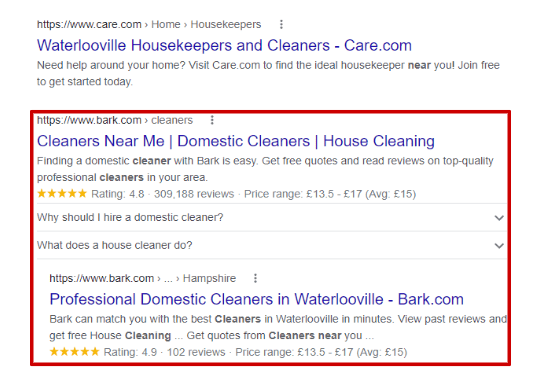The increase in mobile phone usage has given rise to the phenomenon of local SEO, and with 97% of people looking online to find a local business, you can understand how crucial local SEO can be for businesses.
Today we will be looking at some of the areas which can help to audit and ultimately improve a business’s local SEO search ranking.
Understanding Local SEO
In local SEO, there are three main elements that determine your local ranking, these are:
1. Proximity
This is how close your business is to the searcher. Search engines will show businesses that are within a certain radius. Technically speaking, Google uses the IP address of the device to identify relevant and local businesses to show the user.
2. Relevancy
Relevancy is one of the most important factors for local SEO rankings. Google aims to provide the most relevant information to the searcher, so it is important to understand what your customers are searching for and to know what you want your business to rank for.
3. Prominence
The prominence of a website is how well known it is across the internet. Prominence is grown through reviews, sharing your business details such as the name, address and phone number (NAP) or web address across the web. The more you do this, the more Google trusts your website is an authentic and trustworthy business and therefore your website will be ranked higher.
Local SEO Keywords and Monitoring them.
You can use keyword tools such as the Semrush Keyword Magic Tool or Google Keyword Planner to explore the traffic levels and competition around keywords. Finding local keywords should include a keyword and location, this is especially important if you are a small/local business.
You can use BrightLocal’s Rank Tracker tool to see where your business ranks for each keyword, this is a great way to monitor which of your local keywords are driving more traffic to a site.
Local Link Building
By acquiring relevant and authoritative links from local sources, businesses can enhance their visibility in local search results. In this section, we will explain the importance of local link building for improving local SEO.
Local link building can improve local SEO for several reasons:
Enhanced Local Visibility: Local backlinks act as signals to search engines, indicating that your business is relevant to a particular location. When other local websites link to your website, it increases the chances of your business appearing in local search results, making it more visible to potential customers in the area.
Authority and Credibility: Obtaining links from reputable local sources helps establish your business’s authority and credibility in the local community. Search engines consider such links as a vote of confidence, signalling that your business is trustworthy and relevant to the local audience.
Referral Traffic: Local backlinks not only contribute to improved search engine rankings but also generate referral traffic. When users click on a link from a local website and land on your site, it increases the opportunity for potential customers to engage with your business and convert it into leads or sales.
Strategies for Acquiring Local Backlinks
- Reach out to Local Businesses: Identify complementary or non-competitive local businesses and reach out to them for potential link opportunities. Offer to collaborate on content, guest blog on their website, or provide testimonials in exchange for a backlink.
- Participate in Community Events: Engage with local events, such as fundraisers, sponsorships, or industry conferences. By participating actively, you can establish relationships with organizers, local influencers, and other businesses, potentially leading to opportunities for acquiring local backlinks.
- Sponsor Local Organizations: Sponsor local organizations, charities, or community initiatives. Many organizations list their sponsors on their websites, providing an opportunity for a backlink. Ensure that the sponsorship aligns with your business values and target audience.
- Leverage Local Directories: Submit your business to local directories and chambers of commerce. These platforms often provide opportunities for backlinks and citations. Ensure that your business information is consistent across all listings to maximize the impact of local citations.
Site Relevance
With any website, you want to make sure that the site is relevant for industry terms, but with local SEO we want to further this by building a site that is also relevant to the location. We can do this by focusing on a few key areas when optimizing a website.
Earlier we briefly mentioned Local SEO keywords and monitoring them, well your site is the perfect place to implement these, without keyword stuffing, you want to make sure that your page copies, landing pages, meta titles and descriptions are optimized using the keywords you had found. This allows you to create geo signals which tell Google that the site is relevant within a particular area.
Creating blog content that is relevant to your specific area, can also help build your site relevance. Say for instance your company is taking part in an event or is collaborating with another company within the area, then write blog content about it, as it can help Google to know that your site is relevant to that area.

Schema markups are a brilliant way to enhance your meta descriptions if you use the markup available at schema.org it will allow your site to be eligible for rich results.
What are rich results? Well, they essentially provide users with further information about your site before they have even clicked, this could be review scores, FAQs and even a snippet that links to other sites if you have a business that services different areas. Not only can you use rich snippets to improve your local SEO but it also drives more traffic to your site as it is eye-catching to user
Making Sure Your Site is Mobile Friendly
Mobile optimization is becoming increasingly important for local SEO due to the rise in mobile searches. With more people using mobile devices to access the internet and search for local businesses, ensuring a seamless mobile experience has become essential. In this section, we will emphasize the importance of mobile optimization for local SEO, and discuss the significance of responsive web design, fast page loading speeds, and mobile-friendly user experience. We will also provide tips on optimizing websites for mobile devices and testing their performance.s
How to Optimise Your Website for Mobile
- Responsive Web Design: Responsive design ensures that your website adapts and displays properly across various devices and screen sizes. It provides a consistent user experience and eliminates the need for separate mobile and desktop versions of your website.
- Fast Loading Speeds: Mobile users are often on the go and have limited patience for slow-loading websites. Optimizing your website for fast loading speeds improves user experience and reduces bounce rates. Compressing images, minifying code, and leveraging browser caching are some techniques to enhance loading times.
- Mobile-Friendly User Experience: Design your website with mobile users in mind. Optimize font sizes, button placements, and overall layout for smaller screens. Make navigation intuitive and accessible, ensuring that users can find the information they need with ease. Also, consider touch-friendly elements and minimize the need for pinch-to-zoom.
Google Search Console provides a valuable tool for assessing the mobile-friendliness of your website. By using the Mobile Usability report within Search Console, you can determine if there are any issues that may affect how your site performs on mobile devices. This report highlights specific pages that may have mobile usability problems and provides insights into the changes needed to make them mobile-friendly. It offers information on issues such as small font sizes, clickable elements too close together, and viewport configuration problems. By utilizing Google Search Console, you can gain actionable recommendations to improve your site’s mobile experience and ensure optimal performance in mobile search results.
Online Reviews and Reputation Management
Online reviews play a vital role in local SEO and have a significant impact on a business’s reputation. They not only influence a customer’s purchasing decisions but also affect how search engines perceive and rank a business in local search results. In this section, we will discuss the importance of online reviews for local SEO and how they impact a business’s reputation. We will also provide tips on how to encourage customers to leave reviews on platforms like Google Business Profile, Yelp, and industry-specific review sites. Additionally, we will explain how to respond to both positive and negative reviews to show engagement and address customer concerns.
Importance of Online Reviews for Local SEO and Business Reputation
Online reviews have become a powerful factor in local SEO, and search engines like Google take them into account when determining the relevance and credibility of a business. Here’s why online reviews are important:
Trust and Credibility: Positive online reviews build trust among potential customers. When people see that others have had positive experiences with a business, they are more likely to trust that business and choose its products or services.
Local Search Ranking: Search engines consider online reviews as a ranking signal for local search results. Businesses with a higher number of positive reviews and overall ratings are more likely to rank higher, increasing their visibility and attracting more customers.
Customer Feedback and Insights: Online reviews provide valuable feedback and insights into the customer experience. By analyzing reviews, businesses can identify areas for improvement, enhance their products or services, and address customer concerns.
Tips for Encouraging Customer Reviews
Encouraging customers to leave reviews is crucial for maintaining a positive online reputation. Here are some effective strategies to boost customer reviews on platforms like Google Business Profile, Yelp, and industry-specific review sites:
- Provide Exceptional Service: Delivering outstanding service and ensuring customer satisfaction is the foundation for obtaining positive reviews. When customers have a positive experience, they are more likely to share it online.
- Create Review Profiles: Create and optimize business profiles on popular review platforms, making it easy for customers to find and leave reviews. Include direct links to your profiles on your website, email signatures, and social media channels.
- Request Reviews: Politely ask satisfied customers to leave a review. You can do this through personalized emails, post-purchase follow-ups, or by displaying review request prompts at appropriate touchpoints on your website.
- Incentivize Reviews (Ethically): Offer a small incentive, such as a discount or a chance to win a prize, to customers who leave reviews. However, ensure that the incentive doesn’t compromise the authenticity and integrity of the reviews.
Responding to Reviews to Show Engagement and Address Concerns
Responding to both positive and negative reviews is essential for effective reputation management. Here’s how to approach each type of review:
- Responding to Positive Reviews: Express gratitude and appreciation for the customer’s feedback. Personalize your response, mention specific aspects of their experience, and encourage them to visit again. This shows that you value customer feedback and create a positive impression.
- Responding to Negative Reviews: Take negative reviews as an opportunity to showcase your commitment to customer satisfaction. Respond promptly, acknowledge the customer’s concerns, and offer a solution or steps to address the issue. Remain professional, and empathetic, and avoid getting defensive. Take the conversation offline, if necessary, to resolve the matter privately.
- Encourage Dialogue: Regardless of the review’s sentiment, always encourage further communication. Invite customers to reach out directly to discuss their concerns or share more details about their positive experiences. This demonstrates your willingness to engage and resolve issues.
- Monitor and Track Reviews: Regularly monitor your online review profiles to stay informed about new reviews. Set up alerts or use reputation management tools to receive

Are your competitors consistently outranking you?
We can help you understand why and, more importantly, how to change it!
Get an SEO Review Now (Personal Video)
Google Business Profile audit
Google Business Profile (GBP) is arguably at the forefront of any local SEO success. It allows your business to be shown on Google Maps and the map pack and acts as a ‘shop window’ for local businesses.
Having an optimised Google My Business is essential for any business that wants local visibility or serves a number of locations, especially small/local businesses. After setting up a GBP listing, it should always be monitored to check if the information is correct as the public can make changes.
You’ll want to look at these areas:
- NAP (Business name, phone number and website) are all correct and working. A good practice is to ensure they match your website.
- Business categories: Businesses can be ranked for multiple categories but it is important to make sure the most relevant category is your ‘primary’ category as this is what your business ranks for the most.
- Services and products (if applicable) are listed: You should look to optimise these later on so it is important to report whether they are implemented or not.
- Service area: It is important to look at whether all the areas the business serves are listed. If not, you should report what is missing.
- Posts and Pictures: You want to make sure that you’re updating photos, and creating regular posts that have local intent for your Google Business Profile. This shows the listing is active, and up to date.
- Others: look for amenities, special open hours, appointment links, reviews (how many? Are they negative or positive? Have they been replied to?)
Auditing Citations
Citations are essentially business listings on online directories, this helps you to show search engines that your brand is trusted, as other sites are now mentioning the business. Brightlocal’s citations tracker is simple and easy to use, showing you opportunities for directories you aren’t listed on, helping to grow your brand’s trust and awareness online.
For search engines to trust your sites and therefore rank you high, they must see that any details provided about your company match your website. So you want to make sure that your phone numbers, address and email address have no inconsistencies. Brightlocal’s citations track also shows you any irregularities in your business information that is displayed on these sites.
Local SEO audits tips are extremely important to understand the current position the business is in and is the first step to achieving outstanding results. However you can further optimise your business for local search with the help of a local SEO expert, they can audit your site on a more technical level to help you rank higher in the local pack and create a larger footfall for your local business.








One Response
The information is very special, I will have to follow you.